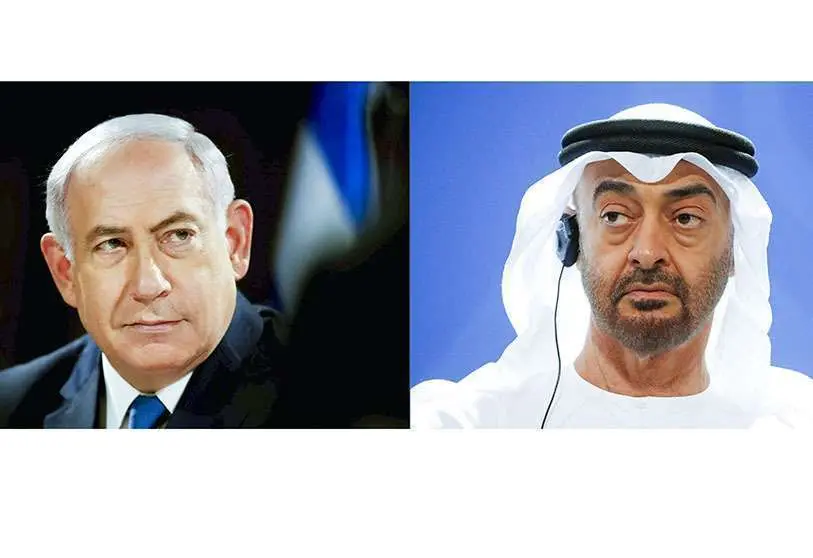Israel and the Arabs

The news fell like a knife. The United Arab Emirates has signed an agreement to normalize diplomatic relations with Israel. After the announcement, there was a cry of indignation among the Palestinians who felt betrayed by a brotherly country. The Palestinian Authority strongly condemned what it called "a betrayal of Jerusalem, the Al-Aqsa Mosque and the Palestinian cause".
Mahmoud Abbas was quick to call his ambassador in the Emirates to show his displeasure and called for an extraordinary session with the Arab League. But everyone knows this and says loud and clear, "the Arab League is many words and very few decisions.
It was under the leadership of Donald Trump that Israeli Prime Minister Benyamin Netanyahu and Mohammed Ben Zayed reached this agreement, according to the American president.
The UAE has consistently defended itself to justify normalization by brandishing the peace charter. Hind al Otaiba, Director of Communications of the Ministry of Foreign Affairs of the United Arab Emirates announced in a tweet that this tripartite agreement 'has led to an agreement to end the Israeli annexation of Palestinian lands'.
The White House, in a press release, assured that Israel would suspend the declaration of sovereignty over the West Bank areas mentioned in the Trump plan. Netanyahu was quick to add that he did not renounce the annexation of Jerusalem.
Therefore, it is in the nuances that diplomacy is done. On the other hand, Israel welcomed the future bilateral agreements on tourism, investment, security and telecommunications that will be signed in the coming weeks and whose content will be made public shortly.
If the news has shocked many people, those who are a little interested in the subject know that a rapprochement has already been agreed between Israel and the UAE. In October 2018, Israel's Minister of Culture and Sports, Miri Regev, visited Abu Dhabi on a working visit. She was the first Israeli woman to officially visit the UAE. However, the minister is well known for her extremism and her racist and anti-Arab statements. A series of visits followed, including that of Communications Minister Ayub Kara and Foreign Minister Yisrael Katz and the more discreet Netanyahu.
Since the announcement of normalization, there has been a succession of angry reactions in Arab countries. Calls for a boycott of the Emirates have been made on both sides and a common position has been requested on behalf of the Arab and Muslim ummah (community).
Where is the Arab world? asks Internet users on social networks. The answer is: nowhere. The Arab world has never existed and will never exist. It is a utopia that should be discarded.
This standardization agreement is perhaps an opportunity to stop this historic scam that we have all studied in school, heard, read...
The question of Palestine and what is happening in the occupied territories must be an issue that must be addressed outside of ethnicity, religion and language. It is above all about human rights and coexistence and must be treated as such.
If Arab countries that have relations with Israel are boycotted, some of them will be killed.
Egypt recognises Israel and diplomatic representations in both countries have existed since the Camp David agreements. Israelis can travel to Egypt without worrying, which is not the case for Palestinians, who are often mistreated at Egyptian airports. Just two years ago, Palestinian actor Ali Selimane was banned from returning to Egypt to serve on the jury of the El Gouna film festival, while Israeli tourism is bringing all of Egypt's Sinai to life.
Following the Oslo Accords and in 1994, Jordan also recognized Israel. Moreover, I know of no one in the "Arab world" who boycotts the United States (even after the century agreement and the annexation of Jerusalem).
Since 2018, Riyadh has been flirting with Tel Aviv. Mohammed Ben Salman claimed that Israel has "a right to exist. No one has boycotted Saudi Arabia, and the pilgrimage to Mecca continues to enrich the Saudi monarchy.
Nothing can stop the common strategic interests these two countries share. Saudi Arabia will do anything to diminish the influence of its great enemy, Iran, and as the old saying goes, the enemy of my enemy is my friend. The Riyadh-Washington-Tel Aviv axis to which the United Arab Emirates is now added is only a bulwark against Iran.
We also know that Kuwait and the Sultanate of Oman are making progress towards normalising relations with Israel.
Perhaps we should get used to the idea that peace between Israel and Palestine will not come from outside but from within. A peace plan between the two countries will only be effective if the lines defined in 1967 are respected.

